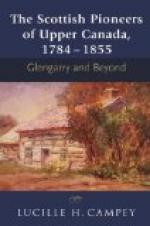Shortly afterwards two of the Ojibwes took the fattest amongst the dead men, cut off his head, and divided his body into five parts, one of which was put into each of five kettles hung over as many fires, which were kindled for this purpose at the door of the house in which the other prisoners were tied up. They then sent to insist on the attendance at their cannibal feast of Wawatam, the adopted brother and protector of Henry. The invitation was delivered after the Amerindian fashion. A small cutting of cedar wood about four inches in length supplies the place of the written or printed invitation to dinner of European civilization, and the man who bore the slip of cedar wood gave particulars as to place and time by word of mouth. Guests on these occasions were expected to bring their own dish and spoon.
In spite of repugnance, Wawatam, to save his life and that of Henry, was obliged to go. He returned after an absence of half an hour, bringing back in his dish the portion given to him—a human hand and a large piece of flesh. His objection to eat this gruesome food was apparently not very deep or persistent. He excused the custom by saying that amongst all Amerindian nations there existed this practice of making a war feast from out of the bodies of the slain after a successful battle.
Soon after this episode of horror the Ojibwes abandoned Fort Michili-Makinak, for fear the English should come to attack it. Henry was hidden by his adopted brother, Wawatam, in a cave, where he found himself by the light of the next morning sleeping on a bed of human bones, which the night before he had taken to be twigs and boughs. The whole of the cave was, in fact, filled with these human remains. No one knew or remembered the reason. Henry thought that the cave had been an ancient receptacle for the bones of persons who had been sacrificed and devoured at war feasts; for, however contemptuous they may be of the flesh, the Amerindians paid particular attention to the bones of human beings—whether friends, relations, or enemies—preserving them unbroken, and depositing them in some place kept exclusively for that purpose.
The great chief of the Ojibwes, however, advised that Henry, who had rejoined Wawatam, should be dressed in disguise as an Indian to save him from any further harm, for the natives all round about were preparing for what they believed to be an inevitable war with the English.
“I could not but consent to the proposal, and the chief was so kind as to assist my friend and his family in effecting that very day the desired metamorphosis. My hair was cut off, and my head shaved, with the exception of a spot on the crown, of about twice the diameter of a crown piece. My face was painted with three or four different colours; some parts of it red, and others black. A shirt was provided for me, painted with vermilion, mixed with grease. A large collar of wampum[5] was put round my neck,




